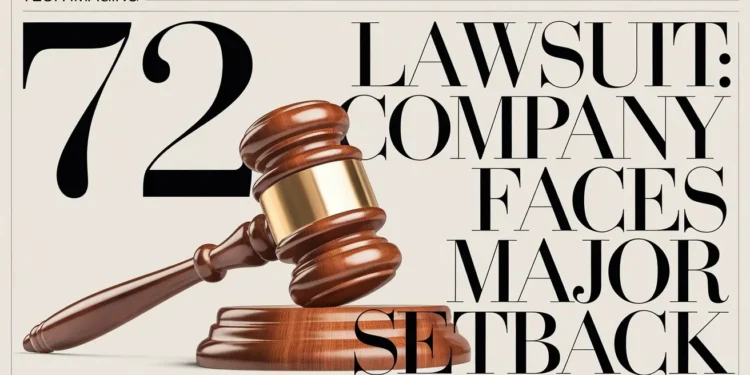The 72 Sold lawsuit is a legal case surrounding the real estate company 72 Sold. This company is known for its unique, accelerated approach to selling homes within 72 hours. While their service is popular, the lawsuit brings questions about how they operate and what this could mean for their business and their customers. This article explores why 72 Sold faces legal issues, what the case involves, and what it could mean for home sellers and the real estate market as a whole.
Why Is 72 Sold in a Lawsuit?
The lawsuit against 72 Sold raises significant questions. The plaintiffs, or the individuals who filed the lawsuit, allege that the company may not fully disclose all aspects of their process to customers or that their marketing methods could mislead potential clients. Some reports suggest that these claims involve the promises made around the 72-hour sale period, the fees, or certain terms that may not be clear to customers initially.
Lawsuits like this one often emerge when customers or business partners feel a company’s practices are unfair or misleading. In this case, if the court finds evidence supporting these claims, it could lead to changes in how 72 Sold advertises or even how they conduct their home-selling services.
Who Filed the Lawsuit?
The plaintiffs in the lawsuit include several former customers and possibly even business associates of 72 Sold who may have been dissatisfied with their experience. These individuals believe they have experienced harm or misrepresentation due to the company’s promises or business model. In many lawsuits of this nature, people who feel misled or financially impacted by a company’s practices seek compensation or changes in the company’s operations.
Such lawsuits aren’t just about money; they often aim to make companies more transparent and responsible in how they handle business, ensuring customers fully understand what they’re getting into.
What Does the Lawsuit Mean for 72 Sold?
The lawsuit could lead to significant consequences for 72 Sold, depending on the final judgment. If the company is found liable, it might need to adjust its advertising strategies or operational practices. Legal scrutiny could also require them to improve transparency, providing clearer details on their fees, terms, and expectations.

Possible Changes for 72 Sold
If the lawsuit ends unfavorably for 72 Sold, they may need to overhaul their marketing approach and perhaps even modify their 72-hour promise to avoid any perceived misrepresentation. Companies in these situations often update their policies to prevent similar claims in the future.
How Customers Might Be Affected
Customers might experience more transparent communication from 72 Sold if the court enforces stricter disclosure requirements. For instance, clients could be presented with more detailed contracts or information about fees and processes, giving them a clearer idea of what to expect.
Impact on Real Estate Market
A lawsuit of this size involving a prominent company like 72 Sold may influence other real estate firms to review their own practices. Competitors might become more cautious with their claims and advertising strategies, ensuring they are not seen as over-promising or misleading.
What Are the Next Steps?
In lawsuits, the next steps involve several stages of legal procedures, including discovery, where both parties exchange evidence and witnesses, and potentially pre-trial hearings. During this phase, 72 Sold will likely provide documentation, testimonies, and other evidence to defend its practices. If the lawsuit does not settle outside of court, it will proceed to trial, where a judge or jury will review all evidence before deciding on the case outcome.
What Do Experts Say About This Lawsuit?
Real estate and legal experts are closely watching the 72 Sold lawsuit as it could set a precedent for future cases. Many experts believe this case could raise awareness around marketing practices within real estate and ensure companies are more upfront about their terms. Some analysts speculate that the lawsuit might encourage 72 Sold to increase transparency in a way that ultimately benefits their clients, regardless of the court outcome.
What Does This Mean for Other Real Estate Companies?

Could More Lawsuits Happen?
This lawsuit could inspire similar cases against other real estate companies. If people feel they have been misled by promises or claims, they might be more inclined to file lawsuits, especially if 72 Sold’s case results in a favorable outcome for the plaintiffs.
How Real Estate Rules May Change
Regulatory bodies may consider introducing stricter guidelines for advertising and contractual transparency, especially in fast-paced selling strategies. Real estate companies may be required to provide clearer documentation and uphold stricter compliance standards to avoid such lawsuits.
What This Means for Home Sellers
Home sellers could benefit from increased transparency across the real estate market. When companies must provide clearer terms, sellers can make more informed decisions about which service or agent to trust with their property sale, reducing misunderstandings or unmet expectations.
How Can Home Sellers Stay Safe?
For home sellers, understanding the details of any real estate service is essential. Sellers should review all documentation carefully, ask questions about any unclear terms, and research the reputation of any company they’re considering. Even if a service promises quick results, taking time to understand all the conditions and costs will help sellers make informed decisions that align with their goals.
Final Words
The 72 Sold lawsuit serves as an important reminder for both real estate companies and clients. For 72 Sold, the case could lead to changes that improve clarity and customer satisfaction, ultimately benefiting their clients. For customers, it’s a reminder to remain vigilant, ask questions, and fully understand the terms of any service they choose. As this lawsuit unfolds, it may reshape expectations and transparency standards within the real estate market, potentially leading to a more customer-friendly industry for all.



